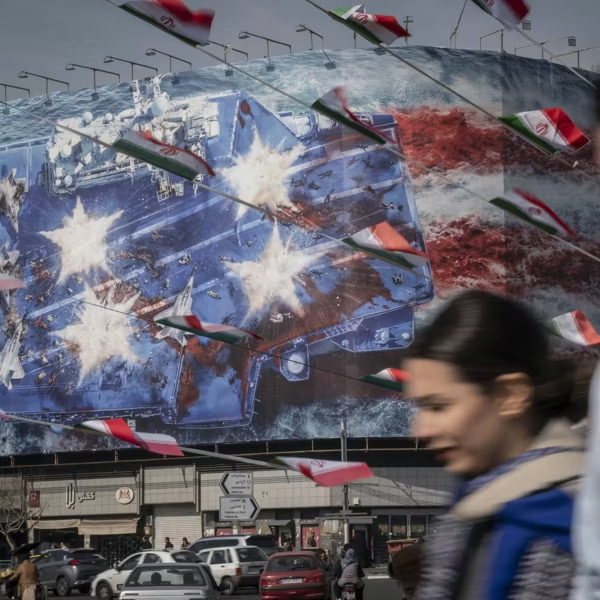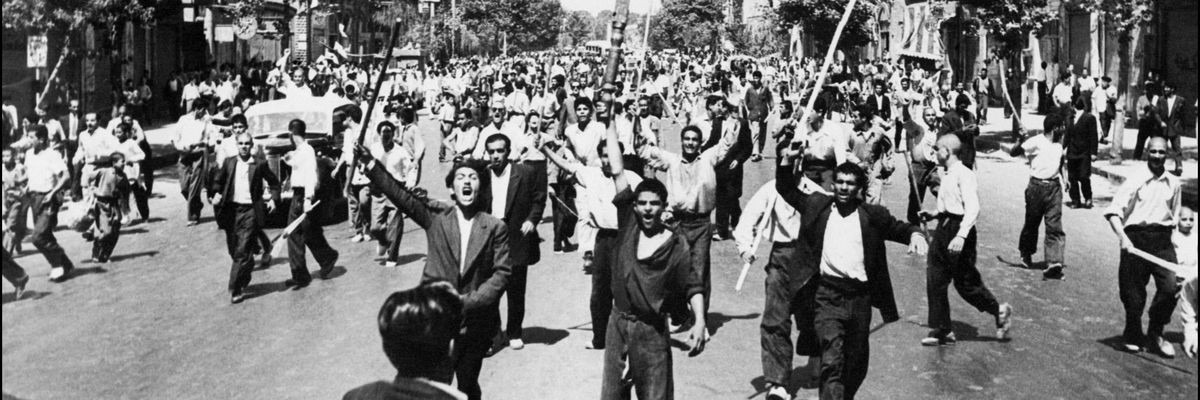The history of U.S.-Iranian relations dates to the time when the once mighty Persian Empire, thanks to the Great Game played by Russia and Great Britain, was anything but mighty.
The “Yengi Donya” or new world, as the Persians called the United States, was an emerging global power with no colonial aspirations in Persia. Iranians admired America for its ideals of liberalism, democracy, and individual freedom. For Iranians, the U.S. was the land of Howard Baskerville, the martyr of their 1906 Constitutional Revolution, and Morgan Shuster, the young financier who tried against all odds to help Iran stand on its feet against British and Russian colonialism. That history is long forgotten, however.
The romantic relationship that once existed between the two countries came to an abrupt end when Washington played a critical role in toppling the government of Prime Minister Mohammad Mosaddegh on August 19, 1953.
Unbeknownst to Iranians, Eisenhower had personally approved “Operation Ajax,” which we know now was assisted by the U.S. Central Intelligence Agency and British intelligence, to remove Mosaddegh. The U.S. had committed its “original sin” in Iran.
In the runup to the coup, Washington cut off its financial assistance to Iran, which, due to a British-sponsored boycott of Iranian oil, was facing a severe financial crisis. Indeed, President Dwight D. Eisenhower, in response to Mosaddegh’s pleas for an emergency loan, had asserted that “it would not be fair to the American taxpayers… to extend any considerable amount of economic aid to Iran.” After the coup, Eisenhower approved an emergency loan in the amount of $45 million to help the new Iranian government.
But unbeknownst to Iranians, Eisenhower had personally approved “Operation Ajax,” which we know now was assisted by the U.S. Central Intelligence Agency and British intelligence, to remove Mosaddegh. The U.S. had committed its “original sin” in Iran.
This episode marked the transformation of the U.S. image from a benevolent power sympathetic to Iranian aspirations to one similar to that of the British and Russians. To many Americans, however, the significance of the coup remains unknown.
Indeed, in the middle of the 1979-80 U.S. embassy hostage crisis, President Jimmy Carter called Mossadegh’s ouster “ancient history” and “something that happened 30 years ago.” But, for many Iranians, the episode’s trauma remains a living memory. Iranian students who stormed the embassy in November 1979, including Ebrahim Asgharzadeh, believed that Washington was “plotting” another coup in Iran by giving refuge to the ailing, exiled Shah. But, with the embassy seizure and subsequent hostage crisis, Iran, too, had committed its “original sin.”
These two episodes have left a deep wound in the relationship between the two countries. As the veteran American diplomat John Limbert observes, “The hostage crisis still casts its long shadow over how America and Americans view Iran. The event lurks behind some American analysts’… descriptions [of Iran] as rogue state, axis of evil…” Indeed, other than sporadic and tactical cooperation on issues of mutual interest, Iran and America have failed to overcome the ghosts of their history.
Obama’s presidency offered an exceptional opportunity to overcome the past decades of squandered opportunities. Except for the breakthrough on the nuclear issue, however, he was faced with Ayatollah Khamenei’s “clenched fist.” Trump’s renunciation of Washington’s commitments under the JCPOA only exacerbated Khamenei’s deeply held suspicions of the U.S.
It Is Time to Move On
Recently, Iran’s former foreign minister, Ali Akbar Salehi, who had advised Khamenei to accept secret talks with the U.S. over the nuclear issue, urged the leadership to hold more comprehensive talks with Washington on the broadest possible range of issues.
“Because of our tensions with the west, especially with the U.S., they pressure us at every opportunity… It is time to sit and talk with the U.S…. maybe we call it political negotiations,” he observed. Salehi, who also served as chief of the Atomic Energy Organization of Iran, warned that so long as Iran was at loggerheads with the U.S. it cannot sustain healthy relations with any country, even including its most powerful partners, China and Russia.
Iran’s nuclear program has long been a source of tension between the two countries. The dispute actually dates back to the Shah’s time when Tehran and Washington fought over Iran’s rights under the nuclear Non-Proliferation Treaty. After the 1979 Islamic Revolution, the U.S. categorically rejected the existing nuclear program in Iran and pressured other countries not to cooperate with Tehran to reconstitute it.
A negotiating framework that addresses mutual interests and concerns, such as the security of the Persian Gulf, is not only desirable and long overdue; it’s necessary.
Realizing that Iran would never agree to halt all uranium enrichment, President Barack Obama accepted a limited but strongly verified program, which led to the signing of JCPOA (which included the four other members of the U.N. Security Council plus Germany) in 2015. However, Trump’s withdrawal from JCPOA unshackled Tehran’s nuclear program from the limits established by the 2015 accord.
While President Joe Biden promised to return to the agreement during his presidential campaign in 2020, the two sides have failed to come to a formal understanding in the two-and-a-half years that followed his inauguration. The Biden administration has thus been pursuing its own “maximum pressure” campaign although its rhetoric has been considerably more diplomatic than the Trump administration’s.
Dismantling Iran’s nuclear program might be an ideal outcome for the U.S., but it is very unlikely that any ruling regime would accept it. Thus, the only viable solution for the U.S. is an agreement that verifiably keeps Iran’s nuclear program checked. For now, the prisoner swap and Iran’s dilution of its 60% enriched-uranium stockpile is a positive step toward deescalation.
Another source of tension between Iran and the U.S. is Iran’s regional ambitions, especially its activities in the Persian Gulf. Washington sees Iran’s harassment of foreign-flagged oil tankers as a threat to international maritime security and the free flow of oil. For the Islamic Republic, as it was for the Shah, the security of the Persian Gulf is indispensable to Iran’s security. When Washington, in violation of international law, confiscated Iranian oil shipments, Iranians responded by seizing and harassing foreign-flagged tankers in the Persian Gulf.
Most recently, the U.S. has escalated by dispatching 3,000 troops to the region with the aim of deterring Iran.
However, the U.S. already has a substantial military presence in the region that is fully capable of deterring Iran. Dispatching more troops will only increase Iran’s insecurities in its immediate periphery. Accidents and miscalculation could drag both sides into an unwanted direct conflict at a time when Washington is more focused on the Ukrainian war and tensions with China over Taiwan and the larger Indo-Pacific region.
Because of its size, population, and strategic location, Iran is one of the pillars of security and stability in the region and cannot be excluded from regional calculations or be expected to capitulate to U.S. ultimatums. Former Secretary of State Mike Pompeo’s 2018 list of 12 demands on Iran totally failed to address any of Iran’s legitimate concerns. This is why the “maximum pressure” policy pursued by Trump, who insisted rhetorically that he would talk to the Iranians without preconditions, failed miserably.
A negotiating framework that addresses mutual interests and concerns, such as the security of the Persian Gulf, is not only desirable and long overdue; it’s necessary.
Iran and the U.S. both have a long list of nefarious things that the other side has done to them; some may be more legitimate than others. But, in the words of former President Ronald Reagan, “between American and Iranian basic national interests there need be no permanent conflict.” It is time for Iran and the U.S. to talk based on recognition of the other party’s core interests and mutual respect.




